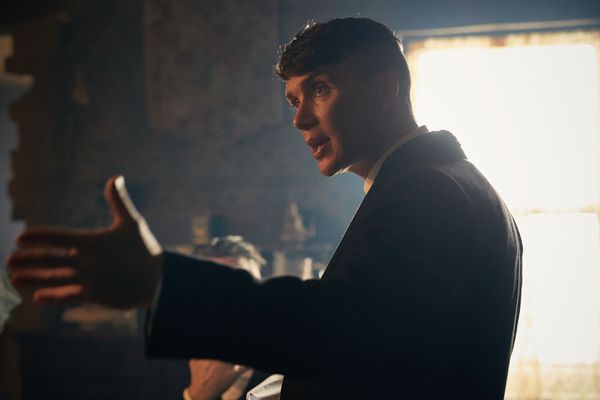
It's become a classic shot. The distinctive tubular bell ringing, percussion jingling and low bass line rumbling as a character does something: usually, walk menacingly. Every action, even a stroll down a hallway, has more meaning when accompanied by a great song. The song in this case is "Red Right Hand" by Nick Cave and The Bad Seeds, and in its "Ted Lasso" premiere, the character who strides out to its unmistakable accompaniment is none other than Roy Kent.
Maybe he's a demon. Maybe he's an assassin. Maybe he's a vengeful god.
"Ted Lasso," the earnest Apple TV + show about an American football coach leading a British soccer team, has never had the musical prowess of shows like "Stranger Things," which re-launched the career of the great Kate Bush to a whole new generation of fans, including my son. Or, "Yellowjackets," which has made excellent use of its '90s setting, thickly weaving songs by Tori Amos, Radiohead and others into its dark storylines — and which, not coincidentally, hired the former "Stranger Things" music supervisor this season.
"Ted Lasso" is different. It's a comedy, not an atmospheric drama like the Showtime and Netflix shows. It's more focused on bringing the emotion through plotlines, sometimes ploddingly. But in this season — strongly rumored to be its last — we've already had intense, meaningful moments centered around song. The Beatles' classic "Hey Jude," which both has an important history in soccer and aligns to the divorce and parenting issues in Ted's personal life, anchored a recent episode. And in the episode titled "International Break," Nick Cave comes to the locker room.
How did one song become such a cultural touchstone and what is about this one, based on a line from a John Milton poem, that so moves us, becoming shorthand for a kind of coming dark change?
"Red Right Hand" was a single off the eighth studio album from Nick Cave and The Bad Seeds, 1994's "Let Love In." Allegedly originating during a jam session for the album, Cave co-wrote the song with Mick Harvey. Its Milton inspiration first comes in the title, which recalls a line from "Paradise Lost" including, in part, "Should intermittent vengeance arm again / His red right hand to plague us?" The phrase is in the chorus of the song too, which Cave growls with his signature dark baritone. Like a poem, every chorus ends a little differently, a variant on what this character is doing with his "red right hand." None of it good.
It's shorthand murder music.
And it's ominous. Despite or perhaps because of the jangly instrumental with its perky percussion, the lyrics spin a murder narrative about a mysterious figure who seems to offer you everything you want, including love and money, but has a nefarious, hidden purpose. Maybe he's a demon. Maybe he's an assassin. Maybe he's a vengeful god. But his red right hand, crimson as if soaked in blood, a kind of permanent Lady MacBeth, doesn't bode well.
The song found itself in that classic of '90s horror films, "Scream." In the movie, it plays as the town quickly shuts down before dark, locking doors, grabbing children and hurrying home, fearing the arrival of the masked killer on the loose. It also made an appearance in "The X-Files," in an episode where Dana Scully is kidnapped and held in a trunk, among other shows and films. It's shorthand murder music.
But it found a home in "Peaky Blinders," where it became the theme song for the beloved show about a family gang in the wake of World War I. That seemed to fit the song best, as if its main character had been born from the forehead of the lyrics, and as if the song eerily predicted the intense and emotional story.
Cave told the New York Times in 2014 he "filled an entire notebook" with place descriptions of the song's setting, "including maps and sketches of prominent buildings, virtually none of which made it into the lyrics." That town with its railroad tracks, mill and viaduct which "looms, / Like a bird of doom" very much recalls the fog-strewn world of "Peaky Blinders" with its docks and liquor warehouses and race horses and seedy industry, a world that Tommy Shelby (Cillian Murphy) walks through with his burdens, trauma and violence. His red right hand holds a gun.
Why use such a distinctive song, a song which we very clearly identify with at least one other show, again? The ready identification works with the humor of it in "Ted Lasso." Because Roy (Brett Goldstein) is walking in his aggressive, Roy way, and we see the alarmed reactions of passersby to the fierce coach, former player, before we see what he's wearing: a very bright, orange tie-dyed T-shirt made by his niece, Phoebe (Elodie Blomfield). How un-Roy-like.

He's the protector. He's sometimes the enforcer. If anyone in the show has a red right hand, it's Roy.
Nobody walks like Roy. Except possibly Tommy Shelby. Even though "Red Right Hand," is used for humorous effect in "Ted Lasso," Roy as Tommy . . . makes sense. Roy is the taciturn character, the most obviously burdened one (although we don't yet know the extent of his burdens . . . room for a spin-off, creators). He also carries the weight of family responsibility, like Tommy, caring for his niece seriously and often. He's the protector. He's sometimes the enforcer. If anyone in the show has a red right hand, it's Roy.

Not to be left out, Juno Temple's Keeley is murdering the feeling of being ashamed of a business failure that isn't her fault (and isn't really a failure, thanks to Rebecca), while also letting go of her wealthy ex Jack (Jodi Balfour). And Barbara (Katy Wix, who I love to root for) is killing off the rumor that she's not secretly cool. I always knew you had it in you, Barbara.
"Red Right Hand" is timeless. Time will tell if "Ted Lasso" as a show is, but some of its characters, like Roy, are etched in our consciousness. He's so distinctively himself, we can't help but try to compare him, to look for his ilk. He's the Tommy Shelby of soccer. He's the sporty Spike. He's the "tall handsome man. / In a dusty black coat with a red right hand."







